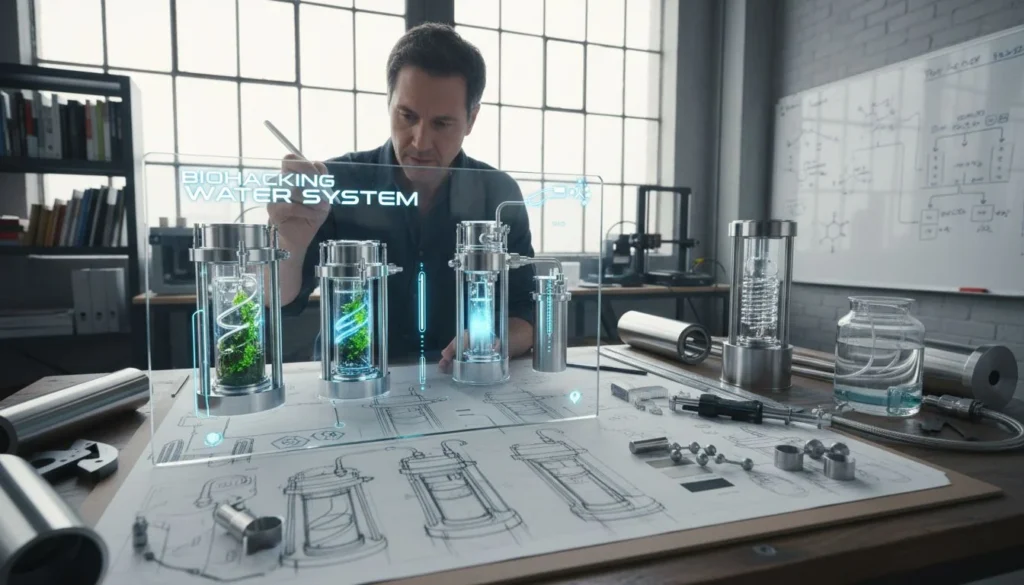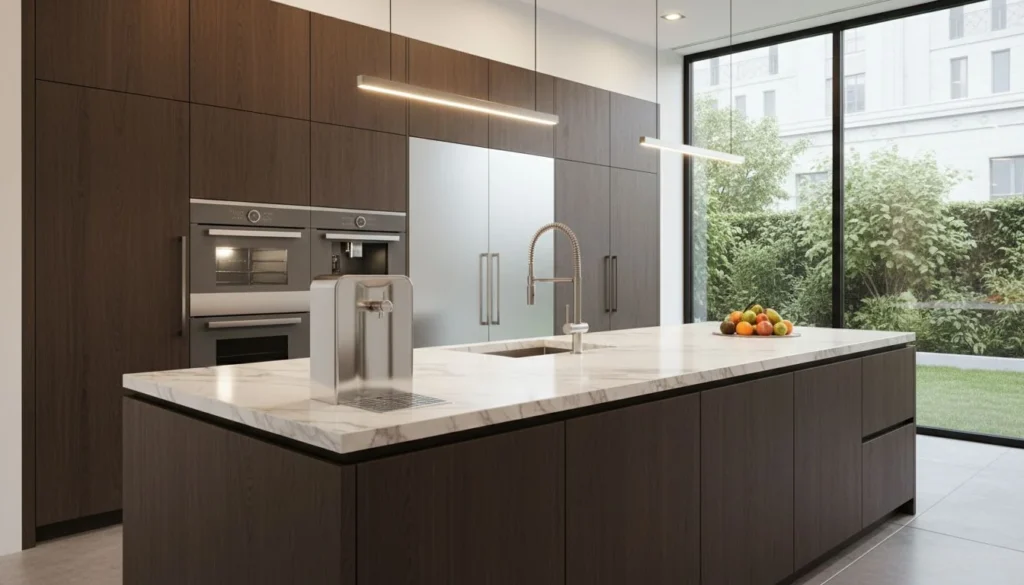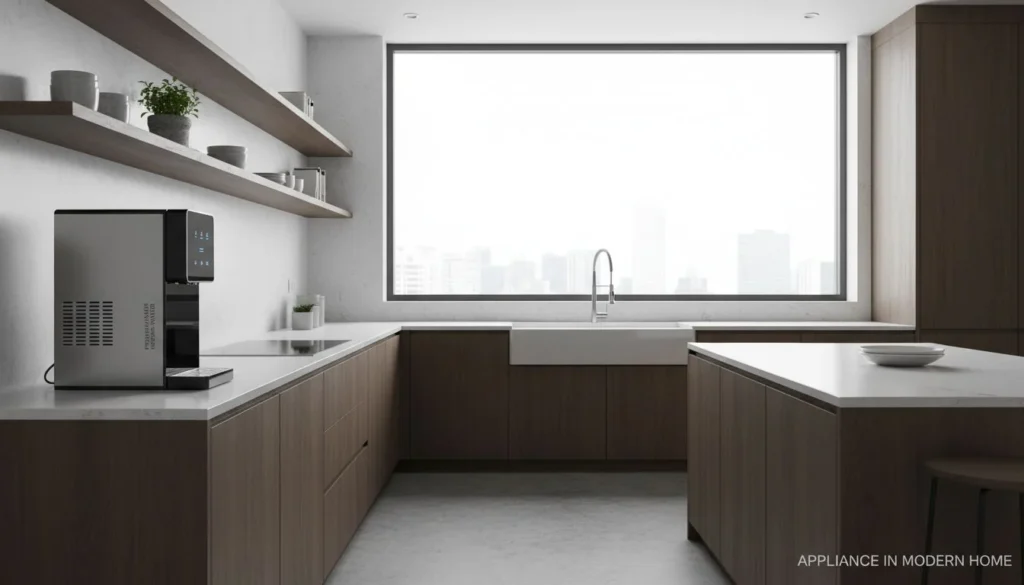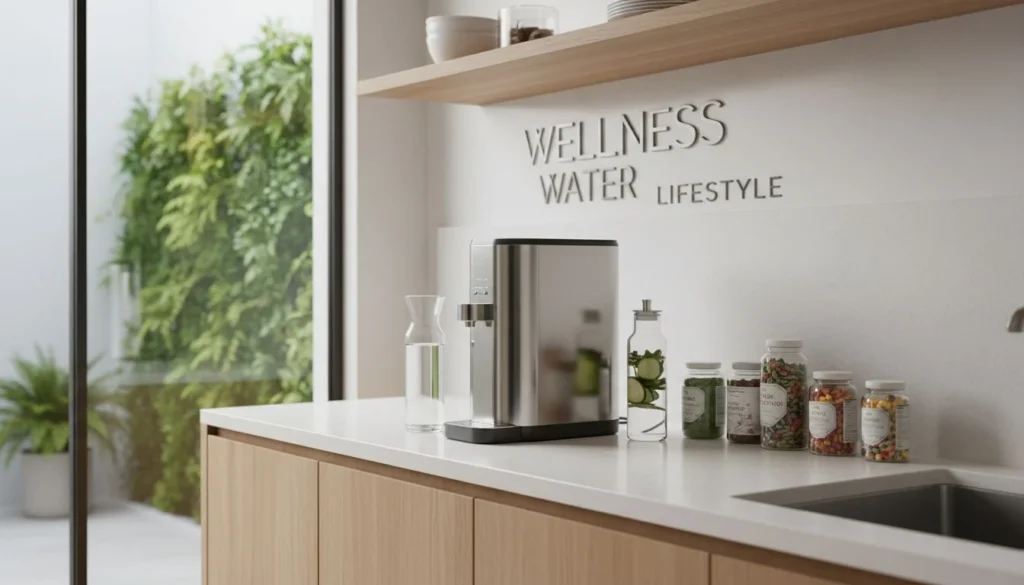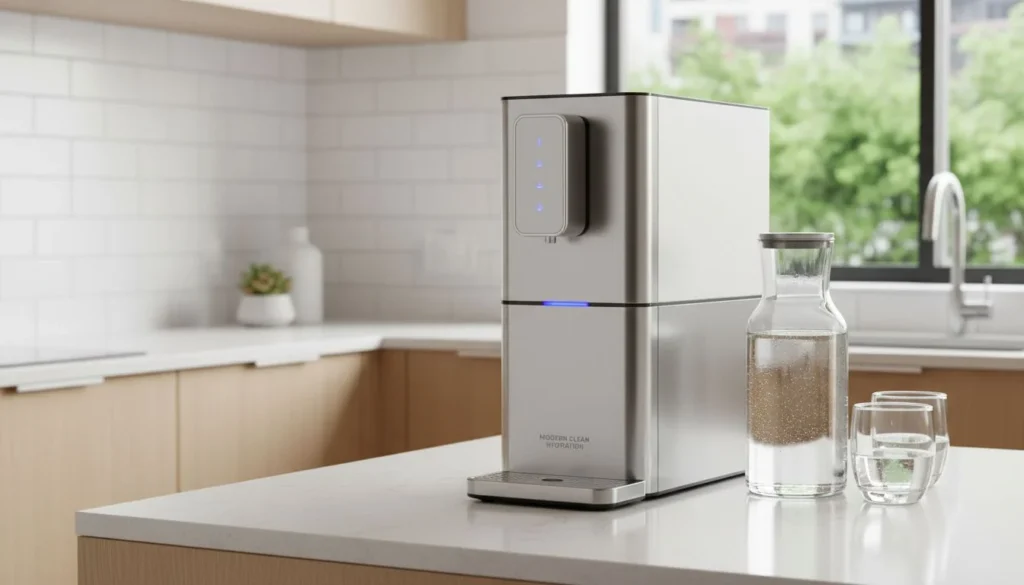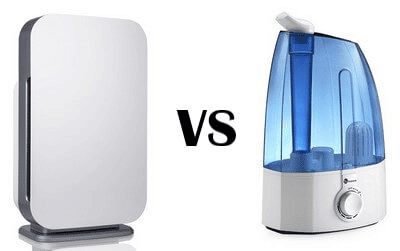
Source de l'image : Conseiller en air ambiant
Les purificateurs d'air et les humidificateurs sont aujourd'hui des articles ménagers courants. Ces deux appareils ont des applications pratiques et améliorent la qualité de l'air intérieur. Mais un purificateur d'air n'est pas la même chose qu'un humidificateur. Les humidificateurs ajoutent de l'humidité, tandis que les purificateurs d'air éliminent les polluants nocifs. Les purificateurs d'air aident davantage les personnes souffrant de troubles respiratoires dus à la sécheresse de l'air que les humidificateurs. Nous dissipons les malentendus et comparons les deux appareils.
Caractéristiques des purificateurs d'air et des humidificateurs
.
| Purificateur d'air | Humidificateur d'air | |
|---|---|---|
| Taille suggérée | L'efficacité d'un purificateur d'air dépend de celle de son filtre, notamment de sa surface et de sa qualité. | La taille de la pièce doit être prise en considération lors du choix d'un humidificateur. |
| Niveau sonore | Purificateur d'air standard : 36 dB | L'humidificateur le plus silencieux : 30 dB |
| Les types | Technologie HEPA, ACT, technologie UV, ions négatifs, ozone | Centrale, ultrasons, roue, évaporateurs, vaporisateurs de vapeur |
| Application | Bénéfique pour les personnes qui recherchent un air pur. Également utile pour les personnes souffrant d'allergies ou d'asthme. | Avantageux pour les personnes souffrant d'asthme et d'irritation des voies respiratoires due à la sécheresse de l'air |
| Fonctionnalité | Les filtres sont utilisés pour capturer et éliminer les polluants en suspension dans l'air. | Augmente l'humidité atmosphérique pour réduire l'inconfort dû à la sécheresse. |
Avantages des purificateurs d'air et des humidificateurs
Purificateur d'air :
- Filtre les impuretés en suspension dans l'air.
- Idéal pour les asthmatiques et les allergiques.
- Utilisable toute l'année.
- Coûteux
Humidificateur d'air :
- L'hydratation de l'air réduit les irritations dues à la sécheresse.
- Pour les nez bouchés et les maladies.
- N'utiliser que dans des conditions sèches.
- Bon marché
Plus que l'humidité qui maintient votre peau élastique, hydratée et douce, l'humidité vous aide également à mieux dormir en relaxant votre esprit pour rétablir la paix au prix d'une certaine fraîcheur lorsque vous êtes à l'intérieur en cas de chaleur excessive, en soulignant le fait que l'humidité réduit les réactions allergiques éruptives. Comme les humidificateurs, il faut quelques jours pour qu'il fonctionne.
Différence entre purificateur d'air et humidificateur d'air
Quelle est la différence entre un purificateur d'air et un humidificateur ? Elle dépend de la manière dont ils sont utilisés.
Purificateur d'air
- Protection contre les virus/bactéries
- Élimine les odeurs
- Filtre, HEPA
Humidificateur d'air
- Qualités antibactériennes.
- Fonctionnement silencieux
- Qualité durable
Entretien des purificateurs d'air et des humidificateurs d'air
Les filtres constituent l'entretien le plus important du purificateur d'air. Ils permettent d'entretenir et de prolonger la durée de vie de votre purificateur d'air. Nettoyez et séchez quotidiennement la base et le réservoir de l'humidificateur d'air. Chaque semaine, éliminez l'accumulation de minéraux avec du vinaigre ou une solution similaire recommandée par le fabricant et désinfectez l'humidificateur avec de l'eau de Javel 10%.
Niveau d'humidité des purificateurs d'air et des humidificateurs d'air
L'humidité varie en fonction de la saison, du temps et de l'emplacement de votre résidence. En général, les taux d'humidité estivaux sont plus élevés que les taux d'humidité hivernaux. Les taux d'humidité intérieurs idéaux se situent entre 30% et 50%. Un taux d'humidité trop faible ou trop élevé peut être problématique. (https://www.mayoclinic.org/diseases-conditions/common-cold/in-depth/humidifiers/art-20048021)
Fonctions et utilisations des purificateurs d'air et des humidificateurs d'air
Comment fonctionne un purificateur d'air ?? Les purificateurs d'air purifient l'air. Les purificateurs d'air éliminent les moisissures, les allergies et les odeurs. Les enfants et les adultes allergiques et asthmatiques peuvent en bénéficier. Humidificateurs ? Les humidificateurs d'air libèrent de la vapeur d'eau chaude ou froide. L'humidification aide les enfants et les adultes congestionnés. L'humidité peut aider la peau et les voies nasales sèches en hiver. Les purificateurs d'air éliminent la poussière, la fumée, les odeurs, les bactéries et les virus. Purificateurs d'air peuvent traiter et prévenir des maladies comme celles des asthmatiques, des allergiques et de ceux qui veulent réduire les polluants et les odeurs. Un humidificateur prévient la sécheresse qui peut irriter de nombreuses régions du corps. Les humidificateurs aident à soigner la peau sèche, le nez, la gorge et les lèvres. Ils réduisent également les symptômes de la grippe et du rhume. Les deux appareils peuvent être utilisés conjointement pendant la saison des allergies, du début du printemps en février jusqu'au début de l'été en juin. Que ce soit dans votre chambre ou dans votre espace de vie.
Durée de vie d'un purificateur d'air ou d'un humidificateur d'air
Les humidificateurs d'air ont une durée de vie de 10 à 15 ans, en fonction de l'entretien et de la qualité de l'eau. Les filtres Hisoair doivent être remplacés tous les 6 à 12 mois, en fonction de la qualité de l'air et des conditions ambiantes. En fonction de la qualité de l'air et des conditions ambiantes, les pré-filtres à charbon doivent être remplacés tous les trois mois.
Coûts des purificateurs d'air et des humidificateurs d'air
Les purificateurs d'air sont relativement coûteux. En revanche, les humidificateurs d'air sont facilement abordables. Un purificateur d'air de qualité peut coûter des centaines, voire des milliers d'euros, alors qu'un humidificateur d'air coûte souvent moins de $100.
Purificateur d'air ou humidificateur : quel est le meilleur choix pour la santé ?
Les purificateurs d'air sont ceux qui combattent le mieux les allergies. Les humidificateurs d'air n'augmentent que l'humidité de l'air, et non la poussière, le pollen ou d'autres allergènes. Les humidificateurs d'air peuvent être utilisés avec les purificateurs d'air.
Un purificateur d'air ou un humidificateur est-il préférable pour les bébés ?
Les purificateurs d'air portables aident les crèches. Choisissez un purificateur d'air avec un CADR élevé pour nettoyer plus rapidement un grand espace. Les filtres à air à haute efficacité montés sur l'appareil retiennent 99,97% des particules en suspension dans l'air. Remplacez le filtre conformément à son emballage. Des voyants électroniques indiquant la durée de vie des filtres aident à changer les filtres de nos appareils.
Qu'est-ce qui est le plus efficace contre les allergies : un humidificateur ou un purificateur d'air ?
Ils présentent tous deux des avantages ; un purificateur d'air efficace est le meilleur choix en ce qui concerne les allergies. Purificateur d'air contre humidificateur d'air pour les allergies, les humidificateurs d'air peuvent aider votre corps à gérer et à réduire les symptômes. En revanche, les purificateurs d'air peuvent éliminer activement les allergies de l'air que vous respirez chez vous.
Qu'est-ce qui est le plus efficace contre l'asthme, un humidificateur ou un purificateur d'air ?
Humidificateur ou purificateur d'air pour l'asthme ? Les purificateurs aident les asthmatiques. Ils permettent de gérer les facteurs déclenchant l'asthme à la maison, car la pollution de l'air est à l'origine de l'asthme. Les humidificateurs d'air facilitent la respiration mais ne traitent pas les allergies ou l'asthme. Utilisez un humidificateur avec parcimonie pour éviter les moisissures et les acariens. Ceux-ci aggravent l'asthme.
Purificateur d'air ou humidificateur pour l'eczéma : Lequel est le meilleur ?
Eczema is caused by skin dryness, further worsened by dry air. Air humidifier is the most effective way to keep the air in your environment "wet" and prevent your skin from drying out.
Purificateur d'air ou humidificateur pour les sinus : Lequel est le meilleur ?
Les humidificateurs d'air peuvent soulager les problèmes de sinus induits par l'hiver. La production de mucus peut être affectée par la sécheresse de l'air. Il s'ensuit une sécheresse de la gorge, du nez et de la bouche. L'utilisation d'un humidificateur d'air permet à notre système nasal de fonctionner correctement. L'humidificateur d'air peut aider vos sinus plus qu'un purificateur d'air.
Purificateur d'air ou humidificateur d'air pour covid 19 : Quel est le meilleur choix ?
Les purificateurs d'air peuvent minimiser les polluants en suspension dans l'air des maisons et des espaces restreints, y compris les virus. Un purificateur d'air portable ne peut à lui seul prévenir le COVID-19. Les purificateurs d'air peuvent contribuer à vous protéger, vous et votre famille, lorsqu'ils sont utilisés avec d'autres précautions recommandées par les CDC.
Purificateur d'air ou humidificateur pour la pneumonie : Quelle est la meilleure solution ?
L'humidificateur d'air a pour fonction d'humidifier l'air, de faciliter la respiration et d'hydrater les voies nasales. Il peut réduire considérablement les symptômes de la pneumonie, tels que la toux, les nausées et les vomissements.
Puis-je utiliser des purificateurs d'air et des humidificateurs en même temps ?
Maintenez-les éloignés l'un de l'autre. Cela permet d'éviter que les gouttes d'eau de l'humidificateur d'air n'endommagent le filtre du purificateur d'air. Pour optimiser le fonctionnement de l'appareil, placez-les de part et d'autre de la pièce.
Puis-je utiliser un humidificateur et un purificateur d'air dans la même pièce ?
Quel est le meilleur endroit pour purifier l'air ?? Vous vous posez peut-être la même question au sujet de l'humidificateur d'air. L'humidificateur d'air et le purificateur d'air peuvent être utilisés ensemble pour remplir des fonctions distinctes et se compléter l'un l'autre. Cependant, les placer trop près l'un de l'autre peut poser des problèmes car l'humidité de l'humidificateur peut obstruer le filtre du purificateur d'air et réduire son efficacité.
Puis-je utiliser un purificateur d'air et un humidificateur en même temps ?
Oui, vous pouvez utiliser un purificateur d'air le 7/24L'humidificateur d'air est un appareil qui fonctionne à la fois comme un humidificateur d'air et comme un humidificateur. L'humidificateur d'air augmente le taux d'humidité de la pièce. Parallèlement, le purificateur d'air fonctionne comme un nettoyeur qui élimine les impuretés de l'air, améliorant ainsi la qualité de l'air intérieur de votre maison et la rendant plus agréable à vivre.
Purificateur d'air ou humidificateur : lequel est le meilleur ?
Ai-je besoin d'un purificateur d'air ou d'un humidificateur d'air ? Les purificateurs d'air améliorent la qualité de l'air intérieur tout au long de l'année. Contrairement à un humidificateur, un purificateur d'air peut être utilisé quotidiennement pour éliminer les allergies et autres polluants. Si vous décidez d'acheter un purificateur d'airLes utilisateurs finaux recommandent de choisir parmi ces marques de purificateurs d'air. Pour les professionnels, vous pouvez consulter www.hisoair.com un fabricant chinois de purificateurs d'air pour obtenir des conseils et des informations.


